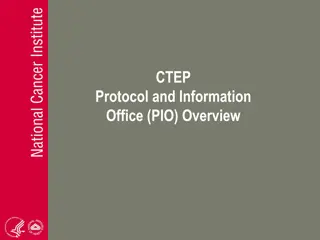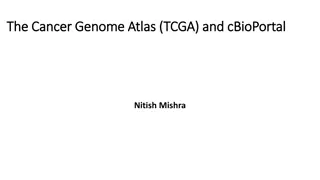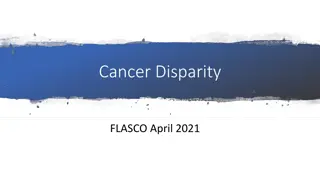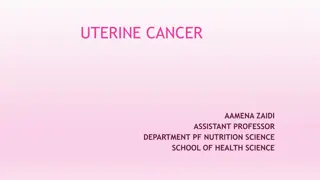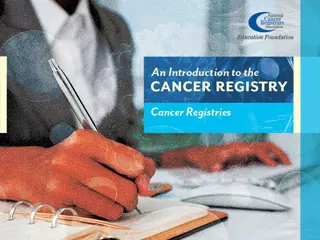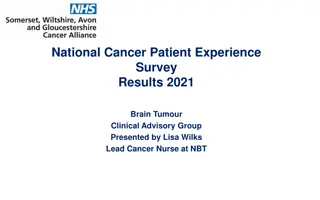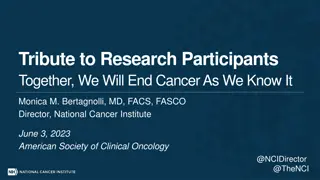Understanding the Role of a Cancer Committee in Comprehensive Care Programs
The Cancer Committee, a multidisciplinary leadership body, plays a crucial role in monitoring and improving cancer program structure and services. Members are responsible for setting goals, evaluating activities, and ensuring compliance with standards. Key responsibilities include appointing coordinators, monitoring patient outcomes, conducting studies, and organizing educational activities. Regular attendance at quarterly meetings and subcommittee groups is required to maintain program effectiveness.
Download Presentation

Please find below an Image/Link to download the presentation.
The content on the website is provided AS IS for your information and personal use only. It may not be sold, licensed, or shared on other websites without obtaining consent from the author. Download presentation by click this link. If you encounter any issues during the download, it is possible that the publisher has removed the file from their server.
E N D
Presentation Transcript
Objectives Define a Cancer Committee Describe the responsibilities of the Cancer Committee Identify Cancer Committee members Review required attendance of the Cancer Committee members Explain the cancer registrar s role
Commission on Cancer (CoC) Accreditation Program Establishes standards to ensure that structures, processes, and outcomes necessary for the delivery of quality and comprehensive cancer care are in place Conducts surveys at cancer programs to assess compliance with standards Required component: Cancer Committee
Cancer Committee Multidisciplinary leadership body Physicians Non-physicians Responsible for monitoring cancer program structure and services
Leadership Responsibilities Leadership is the key element of an effective cancer program Goal setting Planning Initiating Implementing Evaluating Improving all cancer-related activities
Key Responsibilities Appoint a committee member for all required coordinator positions Maintain and monitor compliance of standards Set and monitor annual programmatic and clinical goals Establish and evaluate the quality of the cancer registry data
Key Responsibilities (continued) Monitor: Cancer Conference activity and attendance Percentage of patient accrual to clinical trials Effectiveness of community outreach activities Cancer Committee attendance
Key Responsibilities (continued) Offer cancer-related educational activities Ensure pathology reports are compliant Conduct quality-of-care and outcomes studies Meet performance levels
Meeting Frequency and Attendance At least quarterly Subcommittee working groups Required members or their designated alternate must attend 75% of meetings
Required Physician Members Diagnostic radiology Pathology General surgery Medical oncology Radiation oncology
Required Non-Physician Members Cancer program administrator Oncology nurse and patient navigator Social worker or case manager Certified Tumor Registrar Palliative care professional Genetics professional
Required Coordinators Cancer Conference Quality Improvement Cancer Registry Quality Clinical Research Community Outreach Psychosocial Services
Additional Members Specialty physicians representing top cancer sites Hospice Nutrition Rehabilitation Mental health Pharmacist Pastoral care American Cancer Society
Leadership Roles Cancer Committee Chair Cancer Liaison Physician Evaluating, interpreting, and reporting program s performance National Cancer Database data Reports results of this analysis at least four times each calendar year Three-year term
The Cancer Registrars Role Assist in coordinating meetings Monitors the Cancer Registry quality control plan Run reports for quality studies utilizing registry data Reports to the Cancer Committee Timeliness of abstracting Data accuracy and completeness Annual follow-up rates National Cancer Database and State Registry submissions
The Cancer Registrars Role Participate in discussions and decisions Ensure CoC standards are maintained Maintains supporting documentation Document committee actions by recording them in the CoC survey application record Take minutes
Summary The Cancer Committee plans, implements, and improves cancer activities Required multidisciplinary membership Meet at least quarterly Cancer registrar provides multiple reports
Thank You! NCRA Education Foundation www.ncraeducationfoundation.org NCRA www.ncra-usa.org






